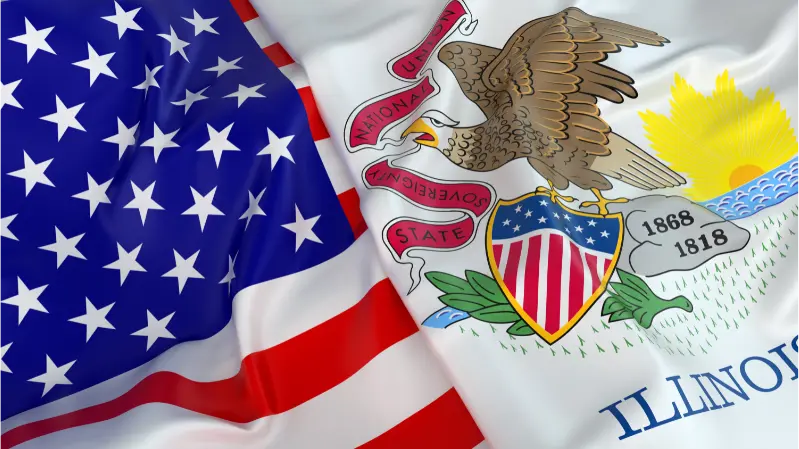What assistance is available for felons in Illinois? Felons living in Illinois can access several support programs to help them get through financial challenges. Grants for felons in Illinois help cover rent, food, and utility costs, while other programs for felons in Illinois provide funding for going back to school, or starting a small business.
Basic Needs Grants For Felons in Illinois 2025

Your felony won’t affect your eligibility for government support programs aimed at low-income residents in Illinois.
SNAP (Food Stamps)
Felons on a low income can get money to help pay for groceries through the Supplemental Nutrition Assistance Program.
The amount you’ll get is based on your income and household size. A single-person household can get up to $292 per month.
The income limit for a single-person household is $2070 per month. Allowable deductions like rent and utilities reduce your overall income for SNAP purposes.
Find out how much you could get Here.
Temporary Assistance For Needy Families
TANF is a monthly cash grant for low-income families with at least one child under 18. You can use TANF to pay for expenses like rent, utilities, clothing, transport, etc. The amount you’ll get depends on your income and family size.
The maximum payment for 1 adult and 1 child is $340 per month.
TANF also provides transitional services to help recipients become financially independent. Services that can benefit felons include:
- GED preparation
- Vocational training
- College programs
- Help with childcare
- Work stipends
- Substance abuse, mental health, and domestic violence support
Utility Bill Assistance
The Low-Income Energy Assistance Program (LIHEAP) pays for some winter heating and summer cooling costs. Emergency payments are also available if you’re in danger of having your utilities shut off.
How much can you get to help with your energy costs? Typical payments range from $200 to $1,000. Applications open twice a year.
Learn more Here.
Employment Grants For in Illinois for Felons

Felons looking for employment support can benefit from the following programs:
Work Opportunity Tax Credit (WOTC)
The WOTC provides a financial incentive encouraging employers to hire workers facing significant barriers to employment. Felons are one of the marginalized groups who can benefit from the program.
When an employer hires an ex-felon they can claim up to 40% of the first year’s wages as a tax credit.
Large companies already know about the WOTC, but smaller employers may not realize they can save thousands of dollars by giving a job to a felon. Ask your Job Center for a WOTC letter of introduction to boost your chances of getting hired.
Also Read: Grants For Convicted Felons in Indiana
Work Innovation And Opportunity Act Grants For Felons
Felons are one of the disadvantaged groups the WIOA is designed to help. WIOA funds pay for the skills training you need to get a good job. Training programs for felons in Illinois and apprenticeships are available for a wide range of careers.
Felons can work with an advisor to identify felon-friendly industries and choose relevant training programs.
To get a better idea of the type of programs you can join, use the search tool at Illinois Work Net. You’ll get details about the training programs, along with how many people got jobs after completing each program.
Illinois Work Net: https://www.illinoisworknet.com/Training/Pages/WIOATrainingProgramSearch.aspx
Life Wireless Grants
Felons who qualify for Life Wireless get a free phone plan with unlimited calls and texts and 4.5 GB of data per month.
If you already get SNAP, TANF, or other means-tested benefits, you’ll qualify for the phone plan, otherwise, you’ll need to meet income limits for the program. For a single person, the income limit is $20,331.
Learn more: https://www.lifewireless.com/plans/illinois-lifeline-free-phone-service
Modest Needs Grants
For individuals experiencing financial hardship due to a sudden crisis, Modest Needs offers small grants to help pay for things like housing costs, vehicle repairs, and medical expenses.
These funds are given to working people who don’t qualify for traditional aid but still need support to stay afloat.
Click Here to Learn more
Housing Grants For Felons In Illinois
What assistance is available for felons in Illinois who need help paying rent? Felons who meet the income limits and pass a criminal background check can qualify for the Housing Choice Voucher Program (HCV) and Project-Based Public Housing Program.
Both programs cover some of your rent making sure you spend no more than 30% of your income on housing.
Don’t be put off by the background check; your felony won’t automatically disqualify you. Housing authorities assess criminal backgrounds on a case-by-case basis.
This means they look at the type of felony, its age, and your rehabilitation efforts, before making a decision.
For more information, visit: https://dcfs.illinois.gov/brighter-futures/independence/housing/subsidized-housing.html
Grants For Felons In Illinois Without Health Insurance
Felons are eligible for Medicaid and Medicare. Both programs give low-income residents access to healthcare services at little to no cost.
Click Here to learn more.
The Illinois Association of Free & Charitable Clinics
Free and low-cost medical clinics provide general medical care and dental treatments to Illinois residents without health insurance.
Find a free clinic Here.
Education Grants For Felons In Illinois
Felons planning to go back to school for a degree or vocational program are eligible for federal and state financial aid.
Pell Grants: Low-income students receive up to $7,395 per year.
FSEOG: Students with exceptional financial need can get up to $4,000 per year.
Illinois Monetary Award Program (MAP): This needs-based grant gives eligible students up to $8,400.
Complete your Free Application for Federal Student Aid (FAFSA) form to find out how much you’ll get.
Learn more: https://www2.ed.gov/programs/fpg/index.html
Small Business Grants For Felons
Find out what grants and small business loans you could be eligible for by making an appointment with a Small Business Development Center advisor.
Your SBDC will also help you create a business plan, provide mentoring and support, and give you access to business education and training programs.
Find your SBDC Here.
Read Also: